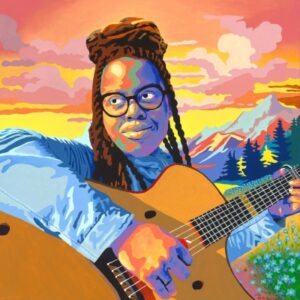Yasmin Williams on Nonesuch (CD Review)
Yasmin Williams – Acadia (Nonesuch)
Guitarist Yasmin Williams displayed a number of unconventional methods for playing acoustic guitar during her first two recorded outings, Unwind (2019) and Urban Driftwood (2022). These were no mere tricks of the trade, instead serving as organic components in her creation of supple folk instrumentals. Acadia is her first recording released on Nonesuch, and features a number of collaborators. In another first, Williams also writes lyrics for her music.
Although it is her primary instrument, on Acadia Williams doesn’t confine herself to the acoustic guitar. She also plays tap shoes, harp guitar, banjo, bass guitar, calabash drum, electric guitar, and kora. On the track “Cliffwalk,” alongside her guitar and tap shoe percussion, folk musician Don Flemons plays rhythm bones. One of the best tracks is “Harvest,” on which Williams and Kaki King trade rhythm guitar patterns while violinist Darian Donovan Thomas outlines a melismatic tune. Abetted by banjo-player Allison de Groot and fiddle player Tatiana Hargreaves, “Hummingbird” starts with an effortless hoe-down and then has a slow interlude in the piece’s middle, the fast music returning in ebullient fashion to conclude it. On “Dawning,” Aoife O’Donovan sings multiple layers of vocalise while percussionists Kafar and Nick Gareiss accompany Williams’s folk style finger-picking. Darlingside and Rich Ruth join Williams, who plays harp guitar, on “Virga,” another nuanced vocal piece.
“Sisters” may have the most collaborators joining Willams, a string trio, marimba player Steph Davis, and another acoustic string-slinger, William Tyler. The arrangement is artfully made, suggesting that Williams could easily do a convincing album with larger groups of musicians. “Dream Lake” is the first track on the album on which Williams plays electric guitar and bass, accompanied by drummer Malick Koly in a piece that opens and closes with New Age music only to rock out in the middle. Multi-instrumentalist Magro contributes drums, synths, and bass guitar to “Nectar,” on which electric guitar is also featured in a fluid solo. On the last piece, “Malamu,” Williams plays both acoustic and electric guitars, with introductions and interludes featuring the former and the verse and chorus abetted by overlapping with the latter. Joined by drummer Marcus Gilmore and saxophonist Emmanual Wilkins, “Malamu” demonstrates a more jazz influenced side of Williams’ playing.
Acadia is one of my favorite albums of 2024, and it reveals exciting potential pathways for Williams to take. I am eager to hear what’s next.
- Christian Carey
